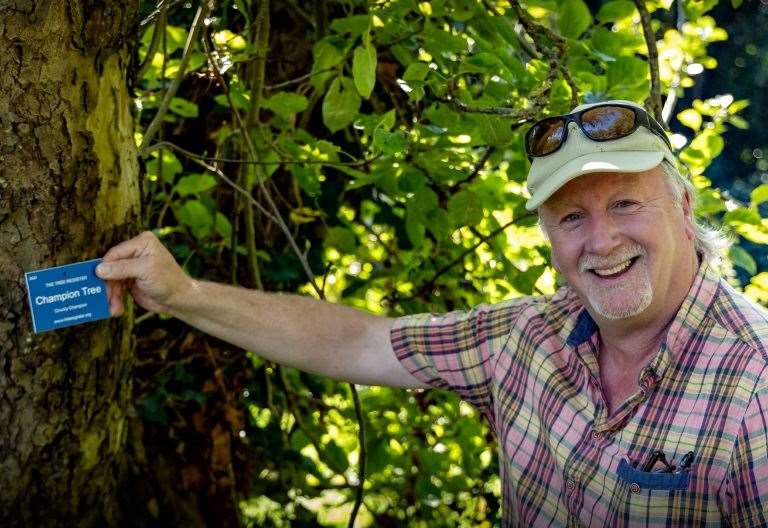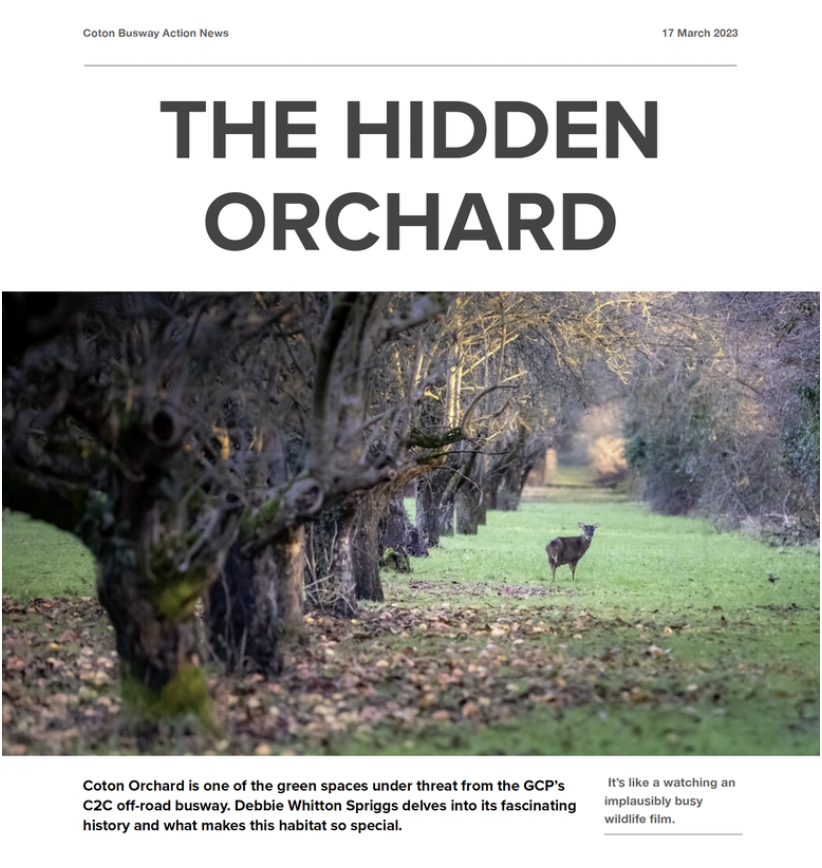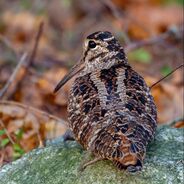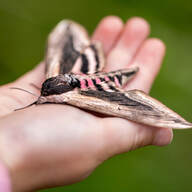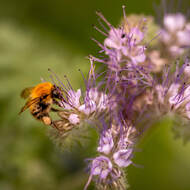|
On the northern edge of Coton village, the off-road busway would run through a 100-year old orchard of 60 acres. Orchards were once numerous in the area and part of the village’s character, but this one is all that remains of that heritage.
Coton Orchard is the largest Traditional Orchard in Cambridgeshire and the eighth largest in the country. Undisturbed by ploughing or pesticides for more than a century, and with a mix of fruit trees, meadow, hedgerows, wild scrub and copse, this vestige of the county’s orchard heritage is home to a rich community of flora and fauna. Orchards such as this are hotspots for biodiversity, and so classed as Priority Habitats. The off-road scheme would lay a 30-metre width of tarmac and concrete right across the site, and remove the section that contains the 100-year old Bramleys. The GCP claims that they will be able to provide a Biodiversity Net Gain (BNG) of 10–20% through various planting schemes, on- and off-site. But the threatened destruction will far exceed the footprint of the busway, and no amount of new planting will be able to compensate or mitigate the loss of this rich, complex ecosystem . Moreover, the fact that there is a viable (and far less expensive) alternative to this off-road scheme means that any BNG calculation is necessarily invalid. Cambridgeshire is the most nature-depleted county in the UK. The destruction of Coton Orchard is a loss it can ill-afford. A County Wildlife Site
Coton Orchard has been selected as a County Wildlife Site (CWS) . Also known as Local Wildlife Sites, these sites are nominated and overseen by the Wildlife Trusts, are recognised as our best sites for wildlife in the county and are designed to complement the statutory Sites of Special Scientific Interest. The Orchard’s CWS status means that it joins a network of sites across the region that contribute to delivering both regional and national conservation priorities. The Wildlife Trust for Bedfordshire, Cambridgeshire & Northamptonshire will continue to work with Coton Orchard, providing advice and helping to ensure that it continues to be developed in ecologically beneficial ways. Champion Trees
Following a visit from The Woodland Trust in 2023, one of the ancient Bramleys gained Champion Tree status
"This is the second largest Bramley Apple that we’ve ever recorded in the whole of Britain and Ireland."
|
Vertical Divider
|
Poetry from Coton Orchard – on sale now. Profits to #SaveCotonOrchard.
|
|
"The extent of these [traditional orchards], crucial to the preservation of wildlife populations, has dramatically withdrawn, leaving many as isolated postage stamps within a sterile wider world. When an ecosystem collapes, the fragments that remain are often too small or scattered to save; to remain intelligible to the wildlife that inhaibited them”
Benedict Macdonald and Nick Gates, Orchard "I am horrified by the proposal to destroy the ancient orchard at Coton. It is hard to exaggerate the importance of this traditional orchard habitat." Steve Oram, Orchard Biodiversity Officer, People’s Trust for Endangered Species |
“Coton Orchard has been assessed against the CWS criteria for Traditional Orchards and meets them on all counts. The ageing fruit trees and nature-friendly approach to management have created a haven for wildlife. The site includes some heritage fruit varieties of local significance, as well as a locally important invertebrate fauna.”
Dr Lucy Wilson, Conservation Officer for The Wildlife Trust BCN |
Biodiversity hotspot
Here are some of the species, some nationally rare, recorded in Coton Orchard.
|
BIRDS
Among the many breeding and overwintering birds recorded in Coton Orchard, are 14 red-listed and 14 amber-listed species. Of these, 8 are included in the local Biodiversity Action Plan. Highlights include: Lesser Spotted Woodpecker, Woodcock, Spotted Flycatcher, Grey Wagtail, Turtle Dove, Nightingale |
|
BATS AND OTHER MAMMALS
The orchard is home to a wide range of mammals including muntjac and roe deer, foxes and many small rodent species. There are at least 8 species of bat recorded foraging in the Orchard, including Western Barbastelle and Serotine (vulnerable) Nathusius’ Pipistrelle, and Liesler’s (near threatened). |
|
OTHER INVERTEBRATES
Surveys have determined that the site has "an important invertebrate assemblage". At least 14 nationally scarce species, plus 11 of local significance. Of particular interest are the Large Fruit Bark Beetle, Shothole Borer Bee, Woodcarving Leaf-cutter Bee, and the Small Heath butterfly which is red-listed as Vulnerable [to extinction]. |
Horticultural heritage
|
Coton Orchard has 500 mature fruit trees, the majority of which are of 'veteran' status. Some of the massive Bramleys (from 1922 planting) are listed on the Ancient Tree Inventory. One of these is the largest in the county and one is the second largest to have ever been recorded in the British Isles. With a circumference of 2.44m it is now officially one of the 'Champion Trees' on the National Tree Register.
The East of England Apple and Orchards Project (EEAOP) have identified 45 varieties of apple, including Chiver’s Delight and Barnack Beauty, both varieties of local significance. There are also eight varieties of plum and five pears. Pruning has been done using the local traditional technique of an open canopy and a short stem and this is a continuing practice. The orchard is used by the EEAOP for pruning courses. Coton Orchard continues to develop as a site of horticultural interest. This year it has welcomed a scion of the Isaac Newton Apple Tree. |
Our supporters
The campaign to save Coton Orchard is supported by the following organisations:
Woodland Trust
The Wildlife Trust for Bedfordshire, Cambridgeshire & Northamptonshire
The Royal Society for the Protection of Birds (RSPB)
Operation Turtle Dove
The Bat Conservation Trust
Bumblebee Conservation Trust
Butterfly Conservation Trust
People’s Trust for Endangered Species (PTES)
Badger Trust
The British Bryological Society
East of England Apples & Orchards Project (EEAOP)
Pesticide Action Network UK (PANUK)
The campaign to save Coton Orchard is supported by the following organisations:
Woodland Trust
The Wildlife Trust for Bedfordshire, Cambridgeshire & Northamptonshire
The Royal Society for the Protection of Birds (RSPB)
Operation Turtle Dove
The Bat Conservation Trust
Bumblebee Conservation Trust
Butterfly Conservation Trust
People’s Trust for Endangered Species (PTES)
Badger Trust
The British Bryological Society
East of England Apples & Orchards Project (EEAOP)
Pesticide Action Network UK (PANUK)


